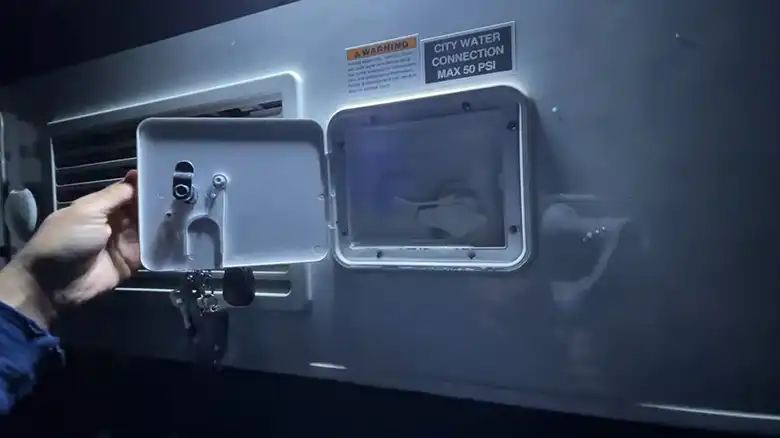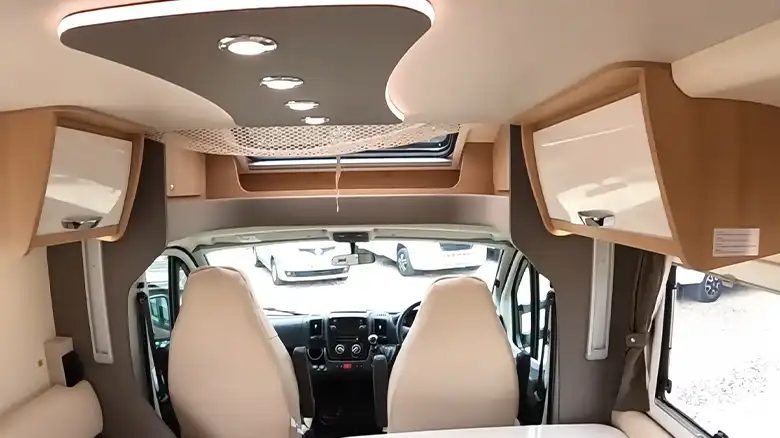Camping is supposed to be a fun and relaxing outdoor activity for me. However, uninvited critters like squirrels can quickly turn my nice camping trip into a nuisance. Squirrels have an amazing ability to access almost any space. Their nimble paws and rodent teeth make short work of rubber seals, wood, wiring, and insulation in my camper. Once inside, they may chew up my upholstery, gnaw on my wires, or make nests out of my insulation.
Getting squirrels out of my camper and keeping them from returning takes some strategic planning and diligent preventative maintenance on my part. By understanding squirrel behavior and addressing all their basic needs that could be met by invading my camper, I can successfully repel them and avoid damage.

Prevent Squirrel Access to Your Camper
The first line of defense is to squirrel-proof all possible entrances. Scan the entire exterior of the camper and note any locations where a squirrel could potentially get inside.
Inspect the Camper for Holes, Gaps, Etc. Where Squirrels Could Enter
Carefully examine vents, windows, doors, and seals for even tiny gaps. Look along the corners and roofline for small holes, cracks, or openings around pipes and fixtures. Any gap wider than 1/4 inch could allow young squirrels inside. Use caulk, foam sealant, metal flashing, or wire mesh to seal up holes and gaps. Replace damaged screens, seals, and vents.
Cover Vents with Mesh When the Camper Is Not In Use
Vents often provide convenient access for squirrels, but remain necessary for proper airflow. Cut pieces of 1/4 inch metal hardware cloth to fit over all vents. Secure the mesh with magnets, snaps, or Velcro when camping. Remove vent covers when occupying the camper so air can properly circulate.
Install Commercial Pest Guards Over Roof Vents
Specialty vent guards designed for keeping pests out are available at most RV supply stores and online. These durable polycarbonate screens allow airflow while preventing critters from chewing through. Guards fitting standard 14”x 14” roof vents cost $30-60. Custom-size guards are also available. Proper installation is key for impeding squirrels.
Eliminate Food Sources to Deter Squirrels
Eliminating anything edible inside the camper removes the reward for squirrels seeking an easy meal. Without access to food, the motivation to chew through barriers drops dramatically.
Keep All Food Properly Sealed and Stored While Camping
Put all foodstuffs (including pet food) in airtight containers like Yeti coolers, heavy-duty storage totes, metal trash cans, or rodent-proof bags. Stash edibles away the moment camp is set up. Never leave crumbs, peelings, or leftovers sitting out. Proper food storage minimizes tempting smells too.
Clean Up Thoroughly After Meals
Scrub cooking/dining areas to remove food residue and smells after each use. Sweep, vacuum, and wipe down all surfaces. Clean dishes immediately and take out trash right away. Remove every trace of food. Starving squirrels can detect scents we can’t smell.
Deposit Trash in Tightly Covered Bins Away From the Camper
Bag all garbage securely and place it in containers with locking lids. Close bins completely after every use. Position trash cans at least 30 feet away from the campsite. Trash smells tempt curious squirrels to investigate and serve as an easy meal source. Removing open garbage cans eliminates this squirrel magnet.
Effective Squirrel Repellents for Your Camper
Applying nasty smells, tastes, or sharp textures along common squirrel routes discourages passage into campers. Repellents make squirrels bypass easier access points nearby.
Apply Commercial Squirrel Repellents Near Openings
Effective options include:
- Hot pepper wax – Coats surfaces with sticky capsaicin oil from hot peppers. A burning sensation repels squirrels.
- Scent repellents – Smelly oils (garlic, predator urine) trigger avoidance. Must be reapplied frequently.
- Combination repellents – Contain ingredients like garlic, capsaicin, and foul egg solids. Longer-lasting.
Reapply repellent around openings every 1-4 weeks per label directions.
Place Ammonia-Soaked Cotton Balls Around Potential Entry Points
The strong odor mimics predator urine marking territory boundaries. Refresh cotton balls every few days when the ammonia smell dissipates. Do not inhale fumes.
Install Ultrasonic Repellers on the Exterior
Battery-powered devices emit high-frequency sound waves only heard by rodents. The noise annoys squirrels and deters nesting. Effective range varies by product from 15-50 feet. Position multiple units to cover the entire camper.
Build Physical Barriers to Keep Squirrels Away
To block squirrels’ climbing routes into campers by applying slippery coatings on walls and poles. Prune overhanging branches allowing roof access. Wrapping sheet metal around trunks isolates trees.
Attach Slick Metal Sheeting Around Roof Vents, Windows Etc.
Cut aluminum, galvanized steel or copper sheets to closely fit the shapes of vents. Attach the slippery barrier using bolts, sealant/caulk or high-bond construction adhesive. Squirrels struggle for traction climbing smooth vertical metal.
Apply a Non-Drying Lubricant Gel to Vertical Surfaces
Special gels stay slippery and limit squirrel grip. Reapply monthly. Product options:
- AFM Safecoat Squirrel Guard – Plant-based gel.
- Slippery Slick – Liquid Teflon formula.
Tree Collars – Slippery Metal Wrapped Around Tree Trunks
Wrap 2-3 foot sections of sheet metal around any trees adjacent to the camper. Attach pieces with bolts or collars are sold preformed. Isolates climbing paths to branches over the roof.
How to Use Traps for Squirrel Control
Live cage traps effectively catch nuisance squirrels alive for humane relocation. Instant kill traps permanently remove destructive rodents. Use traps cautiously with kids and pets around.
Live Traps – Catch and Release
Bait spring or gravity drop traps with walnuts or peanut butter. Check twice daily to limit stress. Drive caught squirrels at least 5 miles away for release (illegal in some states). Never trap lactating females!
Humane Kill Traps
As a last resort for chronic squirrel destruction, lethal traps permanently remove the culprits:
- Body grip kill traps – Spring powered
- Electric zapper traps – High voltage shock
- CO2-powered traps – Inject carbon dioxide
Follow regulations governing trap types in your location. Dispose of carcasses properly. Rotate sets between multiple trap placements.
Extra Tips to Protect Your Camper from Squirrels
Simple preventive measures boost success in keeping campers squirrel-free. Consistency is vital.
- Park Your Camper Away From Potential Squirrel Habitat
Avoid camping near oak trees dropping acorns or stands of pine/hickory with heavy mast crops. Position at least 100 feet from woods with minimal branches above. Keep surrounded by mowed grass or gravel pad.
- Regularly Inspect Your Camper for Signs of Squirrels
Check vents, corners, windows, and seals monthly for new holes, stashes, or evidence of chewing whether camping or not. Early detection allows quick action preventing major destruction. Record dates and areas compromised.
- Combine Multiple Methods for Best Results
Relying solely on one technique rarely succeeds in eliminating squirrels long-term. Integrate exclusion, removal, repelling, and proofing tactics to address all survival needs attractive inside campers. Persevere preventing reinvasion.
FAQs: Squirrel-Proofing Your Camper
- What is the best way to keep squirrels from getting inside my camper?
Sealing all possible entrances with caulk, metal sheeting, and pest mesh provides the most reliable protection. Maintaining campers well also limits damage from invading squirrels.
- Can squirrels chew into campers?
Yes, squirrels can and will chew into rubber seals, screens, wood, and other materials to access sheltered den sites and potential food. Their sharp teeth make easy work of most barriers.
- What smells or sounds deter squirrels from campers?
Smelly commercial repellents, predator urine, hot pepper wax, ammonia, and ultrasonic devices effectively deter squirrels when applied properly around campers. Reapply frequently.
- Why do squirrels want to get into my camper?
Squirrels invade cozy campers seeking warm, dry shelter for nesting and raising litter. They also forage for available food scraps left lying around inside. Removing rewards minimizes unwanted guests.
- How do I humanely get rid of squirrels in a camper?
Sealing up all possible entryways and stacking multiple repellent tactics will convince squirrels to move elsewhere non-lethally. Safely catch and relocate trapped squirrels far from the site.
- Does camper insurance cover squirrel damage?
Whether or not camper insurance covers damage caused by squirrels invading your RV depends on the specific policy. Some standard insurance policies exclude rodents from coverage. Others may cover squirrel depredation only under certain circumstances or with limitations on the amount claimable.
Lastly
Keeping pesky squirrels from invading campers involves dedication to vigilantly excluding, repelling, and removing the motivated rodents. By taking away shelter and food incentives, we can successfully protect camping equipment from destructive squirrel damage using humane, non-lethal management strategies. Consistently implement multiple control methods and remain alert to signs of squirrel reconnaissance. Happy camping without those frustrating freeloaders!
Leave a comment below if you have additional questions on safe, effective ways to squirrel-proof campers and RVs. Thanks for reading!


